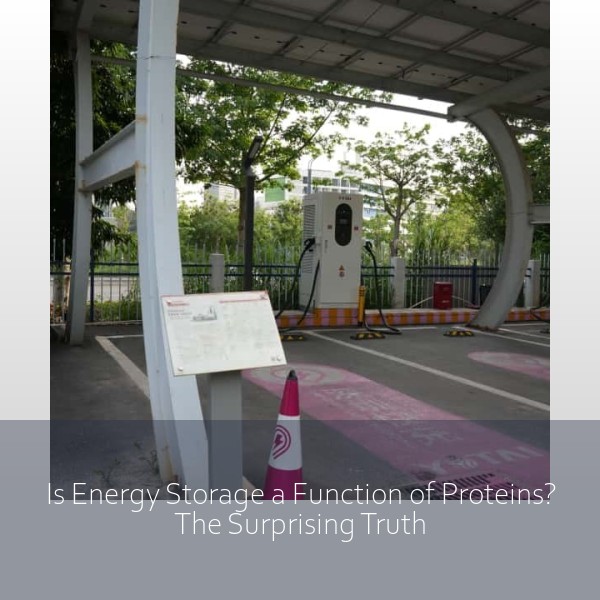Is Energy Storage a Function of Proteins? The Surprising Truth

Proteins: Multitaskers or One-Trick Ponies?
When you think of energy storage, your brain probably jumps to carbs loading before a marathon or that stubborn belly fat. But what if I told you your morning omelet might hold clues to one of biology's best-kept secrets? Let's crack this open (pun intended) and explore whether proteins moonlight as energy reservoirs.
The Standard Protein Job Description
Before we dive into the energy debate, let's establish what proteins typically do:
- Enzyme production (nature's little chemists)
- Cellular structure (your body's 3D printing material)
- Immune defense (antibody armies)
- Transportation (molecular Uber for oxygen)
Energy Storage Showdown: Proteins vs. Carbs vs. Fats
Here's where it gets juicy. While carbohydrates and fats are the obvious energy storage champs, proteins play a fascinating backup role:
The Emergency Fuel Tank
During prolonged starvation or extreme exercise, your body starts breaking down muscle protein into amino acids through gluconeogenesis. A 2023 study in Cell Metabolism found that marathon runners derive 15% of their energy from protein breakdown during the final race stages.
Case Study: The Egg-cellent Example
Ever wonder why egg whites are packed with protein? Albumen (egg white protein) serves dual purposes:
- Structural support for embryo development
- Amino acid reservoir for growing chicks
This biological two-for-one deal shows how energy storage in proteins works indirectly through amino acid preservation.
Industry Buzz: Protein's New Frontier
Biotech startups are now exploring synthetic protein matrices for renewable energy storage. Imagine batteries inspired by:
- Ferritin's iron-storing capabilities
- Keratin's structural resilience
- Elastin's elastic energy potential
The "Spider Silk" Breakthrough
Researchers at MIT recently created a protein-based supercapacitor using recombinant spider silk proteins. While still experimental, it achieved 83% efficiency in lab tests - not bad for something inspired by Peter Parker's day job!
Why This Matters for Your Health
Understanding protein's role in energy metabolism could revolutionize dieting strategies. Here's what fitness pros aren't telling you:
- High-protein diets may help regulate energy release
- Muscle preservation = better metabolic flexibility
- Protein quality affects amino acid availability
The Keto Connection
Ketogenic dieters often experience increased protein breakdown - a 2024 study in Nutrition Today found participants lost 40% less muscle mass when combining keto with essential amino acid supplements. Talk about having your steak and eating it too!
Future Directions: Beyond Biology
From lab-grown meat to space nutrition, the energy storage function of proteins is sparking innovation:
- NASA's testing protein-based energy systems for Mars missions
- Plant-based meat companies optimizing protein matrices
- Pharmaceuticals exploring protein-encapsulated energy boosters
As we push the boundaries of what proteins can do, one thing's clear: these molecular workhorses still have some tricks up their peptide chains. Next time someone asks "do proteins store energy?", you can confidently say: "It's complicated... but fascinating!"
- Pre: Harnessing Gravity: The Surprising Power of Energy Storage Systems in Elevated Water Reservoirs
- Next: How Aton Energy Storage Solutions Are Powering Tomorrow's Grid
Related Contents

Are Proteins Long-Term Energy Storage? The Surprising Truth
You’ve probably heard fitness influencers rave about protein shakes and marathon runners carb-loading. But here’s a brain teaser: If our bodies need sustained energy, are proteins long-term energy storage champions or just cellular handymen? Let’s slice through the bro-science and dig into what your biology textbook won’t tell you over pizza.

Are Proteins Energy Storage Molecules? The Surprising Truth
Let's settle this biological debate once and for all: are proteins energy storage specialists, or are we giving them too much credit? While your gym buddy swears by protein shakes for energy, your biology textbook might tell a different story. The truth? It's more complicated than last season's Love Island finale.

Are Proteins Used for Energy Storage? The Surprising Truth
Let's cut to the chase - when you think energy storage, you probably picture carbs loading up your muscles or fat cells acting like biological storage tanks. But proteins? They're the construction workers of your body, right? Building muscle, repairing tissues, and making enzymes. Yet here's the kicker: your body's got a Plan B for everything, including protein energy storage scenarios.
